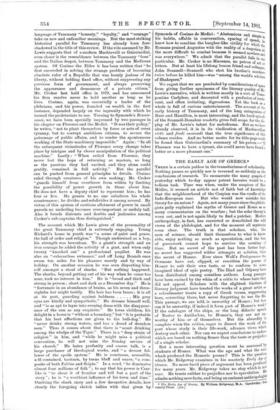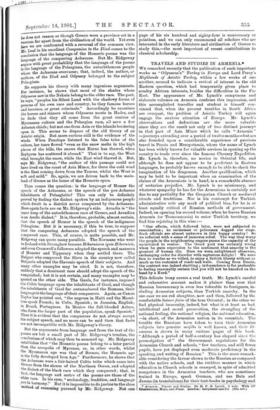THE EARLY AGE OF GREECE.*
THERE is a certain pathos in the tranaitoriness of scholarship. Nothing passes so quickly nor is reversed so suddenly as the conclusions of research. To enumerate the many gospels of yesterday which to-day appear patent heresies would be a tedious task. Time was when, under the auspices of Max Muller, it seemed an article not of faith but of knowledge that the neighbourhood of the Caspian was the cradle of the Indo-European race. But who would now mistake that theory for an axiom P Again, not many years since the philolo- gists gaily explained the myths of Greece and Rome as so many commentaries on the weather ; but the solar theory is worn out, and is not again likely to find a patcher. Modern anthropology, in fact, has corrected or demolished the wild views of the philologist, and for the moment all mysteries seem clear. The truth is that scholars, who, like men of science, should limit themselves to what is know- able, enjoy nothing so much as speculation, and the best of guesswork cannot hope to survive the scrutiny of time. But no secret of the past has been better kept, no secret has suggested wilder attempts at solution, than the secret of Homer. Ever since Wolf's Prolegomena the Germans have cut, clipped, or rewritten the poems of Homer to suit their own taste, or to conform • to some imagined ideal of epic poetry. The Iliad and Odyssey have been distributed among countless authors. Long passages have been excised by the whim of a critic to whose taste they did not appeal. Scholars with the slightest tincture of literary judgment have treated the works of a great artist as a schoolmaster treats a copy of Greek verses,. suppressing here, correcting there, but never forgetting to use the file. This passage, we are told, is unworthy of Homer; but how can it be unworthy, if indeed it form part of Homer's work ? If the catalogue of the ships, or the long didactic speech of Nestor to Antilochus, be Homer's, they are not ufl. worthy of him or of themselves. But the absurdity is complete when the critics, eager to dissect the work of the poet whose study is their life-work, advance views which destroy each other. Nor can we expect conclusions to endure which are based on nothing firmer than the taste or prejudice of a single scholar. But a more interesting question mutt be answered. by students of Homer. What was the age and what the race which produced the Homeric poems P This is the question which Mr. Ridgeway examines in his masterly Early Age of eece. No more lucid piece of argument has been produced for many years. Mr. Ridgeway takes no 'dap which is nut sure. He trusts neither to prejudice nor to speculation. Ile admits nothing save facts, and being an eminent anthrippolugist' • 27,o Early Ago of Gram. B: William 'tideway, M.A. Cambridgq, vanity Prem. pis.] Jo does not reason as though Greece were a province set in a am far apart from the civilisation of the world. Yet even here we are confronted with a. reversal of the common view. we Leaf in his excellent Companion to the Iliad comes to the dusion that the language of the Homeric poems was the awl'anguage of the conquering Achaeans. But Mr. Ridgeway argues with great probability that the language of the poems is the language of the Pelasgians, the autoebthonous people whom the Achaeans overcame; that, indeed, the author, or authors, of the Iliad and Odyssey belonged to the subject He supports his theory with many ingenious arguments. For instance, he shows that most of the shades whom Odysseus saw in the Nekuia belong to the older race. The poet, he says, "peoples his Silent Land with the shadowy forms of persons of his own race and country, be they famous heroes and heroines, or great criminals." Accordingly he examines the heroes and sinners whom Odysseus meets in Hades, and he finds that they all come from the great centres of Mycenaean culture and the Pelasgian raze, all save a few Achaean chiefs; but not one from Asia or the islands bordering upon it. This seems to dispose of the old theory of an Asiatic origin. But more mnious still is the evidence of the winds. When Penelope listened to the false tales of the suitors, her tears flowed "even as the snow melts in the high places of the hills, the snows that Eurus has thawed, when Zephyrue has scattered it abroad." That is to say, the West wind brought the snow, while the East wind thawed it. But, says Mr. Ridgeway, "the author of this passage could not have lived on the coast of Asia Minor, for there the cold wind is the Beat coming down from the Taurus, whilst the West is soft and mild." So, again, we are driven back to the main- land of Greece as the home of the Homeric epics.
Then comes the question : is the language of Homer the speech of the Achaeans, or the speech of the preachaean inhabitants of Pelaegiotis P This can only be definitely proved by finding the dialect spoken by an indigenous people which dwelt in a district never conquered by the Achasans. Here again facts are on Mr. Ridgeway's side. Arcadia is "the inner keep of the autoehthonous race of Greece, and Arcadian is an Aeolic dialect." It is, therefore, probable, almost certain, that the speech of Homer is the speech of the indigenous Pelasgians. But it is necessary, if this be true, to suppose that the conquering Achaeans adopted the speech of the conquered race. This, of course, is quite possible, and Mr. Ridgeway can quote many parallels. The Normans who went to Ireland with Strongbow became Hiberniores ipsis Hibernicis, and even Cromwell's followers adopted the speech and manners of Munster and Tipperary when they settled there. The Bulgari who conquered the Slays in the country now called Bulgaria adopted the Slavonic speech of their subjects. And many other examples may be cited. It is not, therefore, unlikely that a dominant raze should adopt the speech of the vanquished; but it is not certain, and many examples may be quoted on the other side. The Gauls, for instance, imposed the Celtic language upon the inhabitants of Gaul, and though the inhabitants of Gaul far outnumbered the Romans, their language is the language of their conquerors. Again, as Canon Taylor has pointed out, "the negroes in Haiti and the Mauri- tius speak French; in Cuba, Spanish ; in Jamaica, English ; in Brazil, Portuguese. In Mexico the full-blooded Aztecs, who form the larger part of the population, speak Spanish." Thus it is evident that the conquerors do not always accept the subject speech, and no more can be said than that facts are not incompatible with Mr. Ridgeway's theory: But the arguments from language and from the text of the Poems are but a small part of Mr. Ridgeway's treatise, the conclusions of which may thus be summed up. Mr. Ridgeway establishes that "the Homeric poems belong.to a later period than the acropolis of Mycenae, or, in other words, whilst the Mycenaean age was that of Bronze, the Homeric age is the fully developed Iron Age." Furthermore, he shows that the Aehaeans were a lair-haired Celtic tribe which came into Greece from the shores of the Northern Ocean, and adopted the dialect of the bleak race which they conquered'; that, in
the language and metre of the -poemsare those of the der race. In his eyes;" archteology, tradition, and language
rein harmony." But ibis impossible to do justice to the close method of xeasoning pursued lay Mr. Ridgeway. Not one
page of his six hundred and eighty-four is unnecessary or pointless, and we can only recommend all scholars who are interested in the early literature and civilisation of Greece to study this,—the most important of recent contributions to classical scholarship.







































 Previous page
Previous page